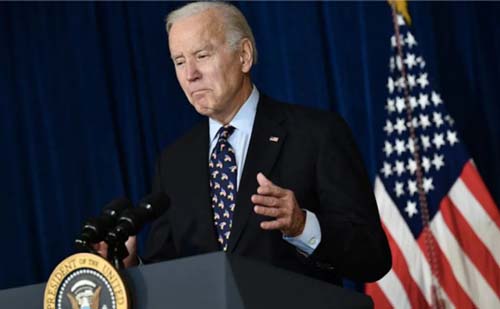
Biden’s Democrats face comprehensive midterms defeat
Dalia Al-Aqidi
Even though it has been more than a month since Russia’s deadly invasion of Ukraine began, Americans are still closely following the news to gather all the details. They are not shy in expressing their admiration for Ukrainian President Volodymyr Zelensky and his pride in his people’s high-spirited defense of their country in the face of the invader.
At home, in the midst of security and economic challenges, Democratic and Republican politicians are preparing for November’s midterm elections. Based on historical precedent, the Republicans are expected to make enough gains to form a majority in both the House and the Senate.
During a roundtable discussion about the 2022 midterm elections on the US television network ABC, veteran Washington Post correspondent Mary Jordan said: “The fact that the Republicans are going to do so well, really, it’s just the history. The president’s party always gets shellacked in midterms. It’s only twice, 1934 and 2002, that the president’s party actually gained in both the House and the Senate.”
In the midst of the Great Depression, President Franklin D. Roosevelt’s Democratic Party gained nine seats in both houses of Congress in the 1934 election. The second time the historical trend was bucked was in the extraordinary midterms of 2002, which were held a year after the Sept. 11 terrorist attacks. Republicans, under the leadership of President George W. Bush, gained eight House seats and two Senate seats.
Simply put, the support base of the party in the White House often feels gratified about its presidential election victory. Therefore, supporters show a lack of interest in the midterms, while the opposition party is more animated and determined to mobilize its base to vote and get Congress back from the other side.
This year’s midterm elections are historically substantial for several reasons. Firstly, the US is slowly recovering from the COVID-19 pandemic, which has claimed the lives of more than 1 million Americans. Secondly, due to inflation and the unprecedented rise in food, goods and gas prices, concerns are increasing in the country. Thirdly, Americans have growing fears over the Russian invasion of Ukraine and its negative security, political and economic implications for the US government and its people.
Biden’s popularity collapsed after last year’s chaotic withdrawal from Afghanistan, which led to global mistrust in his abilities to lead the free world.
All these challenges come as President Joe Biden is experiencing poor approval ratings. According to a poll by the Associated Press-NORC Center for Public Affairs Research, Biden in January hit a low mark for his year-old presidency, with more people disapproving than approving of his performance, 56 percent to 43 percent.
Following meetings with G7 and NATO leaders in Brussels on Thursday, the US president warned in a press conference of global food shortages. “We did talk about food shortages and it’s going to be real. The price of these sanctions is not just imposed upon Russia; it’s imposed upon an awful lot of countries as well, including European countries and our country as well,” Biden said.
He is trying to be the Ronald Reagan of the 21st century by relying on unprecedented Western sanctions against Moscow and providing Kyiv with lethal weapons to deter Russian tanks from storming the Ukrainian capital or its major cities. The White House believes that these steps will help Biden’s efforts to restore his popularity, which collapsed after last year’s chaotic withdrawal from Afghanistan that led to global mistrust in his abilities to lead the free world.
At the press conference in Brussels, Biden defended his ability to manage the Ukrainian crisis when he responded to a question from the German news magazine Der Spiegel, stressing the significance of his foreign policy experience when dealing with Russian President Vladimir Putin. He said: “I have been dealing with foreign policy for longer than anybody who has been involved in the process right now… I don’t think you’ll find any European leader who thinks that I am not up to the task.”
However, the million-dollar question remains: Will Ukraine save Biden and his Democratic Party? I have my doubts. There are six months until the midterms and the American people are known for their short attention span, especially regarding issues that are happening away from US soil.
At the end of the day, voters are worried about their jobs, health and security, especially after two years of national lockdowns and other COVID-19 restrictions. It will take more than Ukraine for the Democrats to hold their ground and satisfy their disappointed constituents. The midterms of 2022 will likely see a big Republican victory.
The writer is a Senior Fellow at the Center for Security Policy
